
Mandenkan-Bulletin Semestriel d Etudes Linguistiques Mande
Scope & Guideline
Pioneering Research in Mande Linguistics
Introduction
Aims and Scopes
- Linguistic Structures and Syntax:
The journal emphasizes the exploration of various syntactic constructions in Mande languages, including the analysis of clauses, pronouns, and information structure. - Morphological Analysis:
It includes studies on morphological features, such as tense-aspect-mood (TAM) systems and agreement features, highlighting the complexity of morphological phenomena in Manding languages. - Language Documentation and Lexicography:
A significant focus is placed on documenting Mande languages through dictionaries and grammatical sketches, aiming to preserve linguistic diversity and provide resources for language learners. - Comparative Linguistics:
The journal encourages comparative studies among Mande languages and between Mande and other language families, contributing to the understanding of typological features and language change. - Sociolinguistic Contexts:
Research often addresses the sociolinguistic aspects of Mande languages, including their use in different contexts, historical documentation, and their role in cultural identity.
Trending and Emerging
- Reflexive and Non-Existential Pronouns:
Recent publications highlight the emergence and grammaticalization of reflexive pronouns in Mande languages, indicating a deeper exploration of pronoun systems and their syntactic roles. - Tense-Aspect-Mood (TAM) Systems:
There is an increasing focus on the intricacies of TAM in Mande languages, particularly in how future tense is represented, showcasing a trend towards detailed morphological analysis. - Information Structure and Non-Verbal Predication:
The exploration of information structure, particularly in relation to non-verbal predication, has gained traction, reflecting a broader interest in discourse analysis and the pragmatics of Mande languages. - Language Resources and Documentation:
The trend towards creating dictionaries and comprehensive language resources is on the rise, highlighting the importance of documentation for language preservation and educational purposes. - Typological Studies:
Emerging studies on typological rarities within Mande languages signal a growing interest in understanding the unique features of these languages in a global linguistic context.
Declining or Waning
- Historical Linguistics:
There appears to be a waning interest in historical linguistic studies relating to Mande languages, with fewer papers addressing diachronic changes or historical language contact phenomena. - Phonetic Studies:
Research specifically focused on phonetic aspects of Mande languages has decreased, suggesting a potential shift towards more syntactic and morphological investigations instead. - Translation Studies:
The exploration of translation and its implications within Mande contexts has become less prominent, possibly as researchers focus more on original linguistic analysis rather than comparative translation work.
Similar Journals
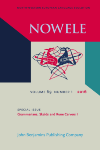
NOWELE-North-Western European Language Evolution
Unveiling the Rich Tapestry of Linguistic ChangeNOWELE-North-Western European Language Evolution, published by John Benjamins Publishing Co, serves as a vital platform for researchers and scholars interested in the evolution and dynamics of North-Western European languages. With an ISSN of 0108-8416 and an E-ISSN of 2212-9715, this journal has been contributing to the field of linguistics since its inception in 1983, with ongoing publications until 2024. Indexed in Scopus and classified in the Q3 category for Linguistics and Language, NOWELE is recognized for its rigorous academic standards and diverse contributions, ranking #485 out of 1088 in the Arts and Humanities category, and #566 out of 1167 in Social Sciences. The journal fosters an open dialogue within the linguistic community, presenting innovative research findings and theoretical advancements. Researchers, professionals, and students alike benefit from its systematic exploration of language evolution in the context of a rapidly changing global linguistic landscape.

Studi e Saggi Linguistici
Illuminating the Nuances of Linguistic PhenomenaStudi e Saggi Linguistici is a distinguished academic journal published by EDIZIONI ETS, based in Pisa, Italy. With its ISSN 0085-6827, this journal has established itself as a vital resource in the field of linguistics, particularly noted for its contributions since its inception in 2016. Although currently categorized in the lower quartile (Q4) by the 2023 metrics in the domains of Linguistics and Language within Scopus, it remains a significant platform for innovative research and critical discussions surrounding language studies. Focusing on both theoretical and practical aspects of linguistics, the journal serves as a nexus for scholars and practitioners alike, facilitating a rich interchange of ideas and knowledge in a rapidly evolving discipline. As an invaluable publication for researchers, professionals, and students, Studi e Saggi Linguistici is committed to advancing the understanding of linguistic phenomena and fostering scholarly communication in its field.
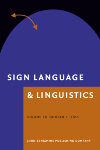
Sign Language & Linguistics
Bridging Cultures through Sign Language ResearchSign Language & Linguistics is an esteemed academic journal published by John Benjamins Publishing Co, dedicated to advancing the field of sign language studies and linguistics. With an ISSN of 1387-9316 and an E-ISSN of 1569-996X, this journal has earned a prominent place in the linguistic community, achieving a Q1 ranking in both the Linguistics and Language category, and standing out within the Scopus rankings, placing in the 77th percentile among the Arts and Humanities and 75th percentile in the Social Sciences categories. Sign Language & Linguistics spans over two decades of research, offering comprehensive insights and analyses from 1998 to 2024, promoting high-quality scholarly communication. Aimed at researchers, professionals, and students alike, this journal is essential for those exploring the intersection of sign languages, linguistics, and cultural studies, facilitating progressive discourse and fostering an understanding of this vital mode of human communication.

Brills Annual of Afroasiatic Languages and Linguistics
Unveiling the Rich Tapestry of Afroasiatic LanguagesBrill's Annual of Afroasiatic Languages and Linguistics stands as a vital publication in the field of linguistics, specifically focusing on the rich and diverse Afroasiatic language family. Published by the esteemed BRILL, this journal has garnered a reputation for rigorous scholarship since its inception in 2009, converging into its current publication cycle through to 2024. With an ISSN of 1876-6633 and an E-ISSN of 1877-6930, it enjoys a commendable Category Quartile ranking of Q2 in Linguistics and Language for 2023 and respectable Scopus rankings in both Arts and Humanities and Social Sciences. This journal aims to provide a platform for researchers, educators, and students alike, facilitating the dissemination of innovative research, critical analyses, and theoretical advancements within the Afroasiatic linguistic domain. Given its substantial engagement with contemporary linguistics, this annual publication is invaluable for those aiming to deepen their understanding of languages and dialects across the Afroasiatic spectrum.
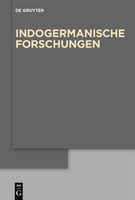
INDOGERMANISCHE FORSCHUNGEN
Exploring the Depths of Indo-European LinguisticsINDOGERMANISCHE FORSCHUNGEN is a prominent academic journal, published by WALTER DE GRUYTER GMBH, focused on the field of linguistics and language studies. With an impressive history that dates back to 1892, this journal has been a vital resource for researchers and professionals exploring the intricacies of Indo-European languages. Although it does not offer open access, its comprehensive and rigorous articles—published in both print (ISSN: 0019-7262) and electronic formats (E-ISSN: 1613-0405)—are instrumental for anyone delving into historical linguistics and comparative studies. The journal currently holds a Q3 ranking in Linguistics and Language, indicating its significance within the academic community, as evidenced by its Scopus rankings in both the Arts and Humanities and Social Sciences domains. Spanning decades of scholarship, INDOGERMANISCHE FORSCHUNGEN plays a pivotal role in advancing the study of language and is essential for scholars aiming to contribute to the dialogue in this ever-evolving discipline.
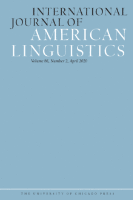
INTERNATIONAL JOURNAL OF AMERICAN LINGUISTICS
Navigating the Landscape of American Linguistics.The INTERNATIONAL JOURNAL OF AMERICAN LINGUISTICS, published by University of Chicago Press, is a revered scholarly publication dedicated to the exploration and advancement of linguistic studies, particularly those related to the American linguistic landscape. With an ISSN of 0020-7071 and an E-ISSN of 1545-7001, this journal serves as a vital platform for researchers, professionals, and students interested in the nuances of language, dialects, and linguistic structures through rigorous academic inquiry. The journal has established a commendable impact, reflected in its ranking within the Q2 category in Linguistics and Language and its placements in the Scopus rankings, thereby positioning itself within the 50th to 53rd percentile of its respective fields. While the journal does not provide Open Access options, it continues to be a cornerstone resource for those seeking to expand their understanding of American linguistics, already converging from 1996 to 2024. Through its continued commitment to excellence, this publication remains essential for those aiming to contribute significantly to the field.
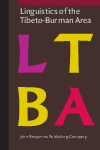
Linguistics of the Tibeto-Burman Area
Fostering Interdisciplinary Insights in Linguistic DiversityLinguistics of the Tibeto-Burman Area is a premier journal dedicated to the study and exploration of the Tibeto-Burman languages, offering a significant platform for researchers, scholars, and practitioners in the field of linguistics. Published by John Benjamins Publishing Co, this journal not only maintains rigorous scholarly standards but also aims to contribute to the understanding of language diversity and evolution within the Tibeto-Burman region. With an impressive Q2 ranking in linguistics and language, it ranks in the 49th percentile within Arts and Humanities and the 45th percentile in Social Sciences, highlighting its relevance and quality in the academic community. Since its inception in 2011, the journal has been at the forefront of disseminating research that encourages interdisciplinary dialogue and fosters insights into language structure, use, and cultural implications. Though not an open access publication, it remains accessible to institutions and individuals alike, ensuring that vital academic discussions continue. The ISSN for print is 0731-3500 and for the electronic version, 2214-5907, facilitating the work of the growing scholarly community engaged in Tibeto-Burman linguistics.
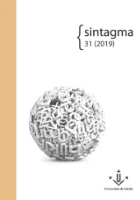
Sintagma is a prominent academic journal dedicated to advancing the field of Linguistics and Language, published by the Universitat de Lleida in Spain. With an ISSN of 0214-9141 and an E-ISSN of 2013-6455, this journal has established itself as an open-access platform since 1989, thereby ensuring wide accessibility and dissemination of research. The journal's commitment to quality is reflected in its ranking within the Q4 quartile of Linguistics and Language in 2021 and a similar standing in Social Sciences and Arts and Humanities, which underscores its emerging importance in these fields despite recent challenges. Covering topics that span theoretical inquiries to applied linguistic studies, Sintagma invites researchers, professionals, and students to contribute to and engage with its evolving landscape from its unique academic perspective. With the convergence of research years from 2011 to 2018 and upcoming issues through 2024, the journal remains poised to provide insightful content that addresses the linguistic dimensions of contemporary society.

Suvremena Lingvistika
Empowering Language Research Through Open Access.Suvremena Lingvistika is a distinguished open-access journal published by the Croatian Philological Society, dedicated to advancing research in the field of linguistics and language. Since its establishment, the journal has been pivotal in promoting scholarly dialogue within the linguistics community, especially among researchers and academics in Croatia and beyond. With an ISSN of 0586-0296 and an E-ISSN of 1847-117X, the journal has transitioned to an open-access model since 2007, ensuring that research is freely accessible to all. As of 2023, it holds a respectable Q3 ranking in the Linguistics and Language category, reflecting its potential contribution to the field. The journal's scope encompasses a wide array of linguistic disciplines, encouraging both theoretical and empirical studies. Supportive of new research, Suvremena Lingvistika aims to foster innovative approaches and methodologies in linguistics, making it an essential resource for students, researchers, and professionals eager to explore the complexities of language. With its ongoing publication until 2024, it continues to shape the linguistic landscape, providing valuable insights and fostering collaboration among scholars globally.
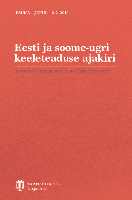
Eesti ja Soome-Ugri Keeleteaduse Ajakiri-Journal of Estonian and Finno-Ugric Linguistics
Advancing the Understanding of Finno-Ugric LinguisticsEesti ja Soome-Ugri Keeleteaduse Ajakiri - Journal of Estonian and Finno-Ugric Linguistics is a premier academic journal published by UNIV TARTU PRESS, dedicated to advancing the field of linguistics with a particular focus on the Estonian and Finno-Ugric languages. Since its inception, the journal has embraced an Open Access publishing model, allowing researchers and enthusiasts to freely explore its groundbreaking studies and findings since 2013. With an Impact Factor that places it in the Q3 quartile of leading journals within the linguistic domain, it serves as a vital platform for the dissemination of new research and theoretical advancements. Ranked 410th out of 1088 journals in the Arts and Humanities category for Language and Linguistics, it reflects a robust commitment to quality scholarship that appeals to academics, professionals, and students alike. Operating from Tartu, Estonia, the journal aims to foster greater understanding and appreciation of the Estonian language within the broader context of Finno-Ugric studies, making it an essential resource for anyone interested in these unique linguistic cultures.